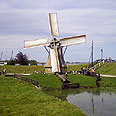
Jew-hatred in Holland
Dutch government won’t pay for security of Jews, while anti-Semitism continues to grow
The other week during a debate in a parliamentary commission on the current anti-Semitism in the Netherlands, several MPs asked the Dutch government to pay for the Jews’ security. However, Minister of Security and Justice Ivo Opstelten stuck to the position of his predecessors saying that security is the responsibility of the Jewish community itself and if necessary, of the local authorities. The latter are rarely willing to pay for these expenses.
The Dutch Parliament has existed for almost 200 years. The first plenary meeting ever on contemporary anti-Semitism took place last June after a series of articles in the media about anti-Semitic incidents. One article in the prominent daily NRC Handelsblad was titled: “Anti-Semitism is more than an incident. It is normal.” The fact that a second parliamentary meeting was called for a few months later is a sign that nothing has been solved.
The main targets of anti-Semitic harassment in public are a small number of Jews who are recognizably attired as such. In past weeks, several newspapers have reported that Rabbi Raph Evers, the head of the Dutch Jewish Seminary, no longer travels on public transportation because of the harassment he encounters there. He walks out on the street as little as possible. Chief Rabbi Binyomin Jacobs is also frequently insulted in public. His home is fitted with an alarm system which links him directly to the police. Jacobs says 35 year ago, no one insulted him.
What were not mentioned in the Dutch media are the experiences of those Jews who had been repeatedly harassed and now live elsewhere. One Dutch Jewish youngster living in Jerusalem told me that while he was a student at Amsterdam University, he earned a living working in a supermarket in the center of town. He wore a small yarmulke. He was insulted at work on the average twice a week with calls like: “cancer-Jew” of “Hamas Hamas, Jews to the gas.” All of this harassment came from customers of Moroccan ethnicity.
I also interviewed another youngster now living in Jerusalem, who wears ultra-Orthodox garb. A few months ago he visited his parents in the Netherlands. When he changed trains after arriving from Belgium at the Dutch border station Rozendaal, he was immediately shouted at in English by a man with a heavy Dutch accent: “You killed Jesus.” At his arrival in Arnhem, where he exited the station through the back door, he was insulted as well. The same happened when he left from the same station. During his stay in The Netherlands he hardly left his parents’ home.
Non-selective immigration policy
Only limited parts of the Dutch Jewish community encounter substantial anti-Semitism. Besides the aforementioned harassment of recognizably dressed Jews, it impacts mainly on Jewish children in schools and through insults in the workplace. The Jewish community now explicitly blames the disproportionately large role in anti-Semitic incidents of Muslims who account for six percent of the population. The most problematic elements come from the Moroccan, and to a lesser extent, Turkish community.
Over the past decades, Dutch governments have non-selectively allowed in 1.6 million non-Western immigrants, about 10% of the population. Of these, one million originate in Muslim countries where anti-Semitism is far stronger than in the Netherlands. It is thus not surprising that the percentage of anti-Semites among these immigrants is substantially higher than among the local Dutch population. One could put it differently: the Dutch government has for many years followed an anti-Semitism-promoting immigration policy.
It would be desirable to undertake a detailed poll on anti-Semitism among Muslim immigrants as compared to the autochthonous population. One could then also analyze to what extent this anti-Semitism is fueled by families, mosques, schools, friends, or foreign incitement. This would be very useful in the battle against one of the main sources of anti-Semitism. Such an investigation would be, however, far too big a betrayal of Dutch taboos.
Last week’s parliamentary debate had its origin in the media discussion engendered by my book “The Decay: Jews in a Rudderless Netherlands.” It quoted senior Dutch politician and former EU commissioner Frits Bolkestein stating that recognizable Jews should advise their children to leave for the United States or Israel.
However, the book did not focus on anti-Semitism. It had two major themes. The first one, that Jews have a symbolic importance in the Netherlands which goes far beyond the real importance of the community, and the second was that by watching the interaction of the Jewish community and Dutch society at large, one obtains a prism on many aspects of the functioning and problems of Dutch society.
The recent discussions and debates have borne these two points out once more. Minister Opstelten stated that there would be zero tolerance for anti-Semitic incidents and registration of incidents at school. However, the Dutch police are unlikely to be able to become more efficient in the coming months. It is also unlikely that recognizable Jews can soon walk unhindered in certain parts of the country in the near future.
Approximately 10 years ago, there were major inquiries and debates in Dutch society about government failures of post-war restitution of Jewish assets looted in the Holocaust. One of the many criticisms about the Dutch government’s handling of the situation was that it had wrongly charged the surviving Jews for the administrative services involved in returning what was looted from them because the Dutch government could not protect them during the occupation.
A commission of inquiry said that this was a public duty and thus needed to be provided free of charge.
One wonders whether in the future, investigators will conclude that the Dutch government has misbehaved against the Jews once again by failing to pay for their protection and that of their institutions, which is also, clearly, a public duty.
Dr. Manfred Gerstenfeld has published nineteen books, several of which deal with European anti-Semitism
- Follow Ynetnews on Facebook










